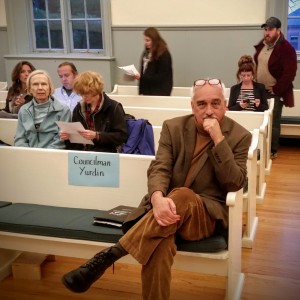
Steve Brown, the executive director of the Rhode Island ACLU has issued a statement regarding Providence City Councillor Kevin Jackson’s lawsuit against the two people, Patricia Kammerer and Karina Holyoak Wood, who have organized a recall effort and petition against him.
Jackson’s lawsuit also names the City of Providence and the Providence Board of Canvassers.
“The ACLU is not familiar enough with the mechanics of the City’s recall mechanism to comment on the specifics of the allegations contained in Councilor Jackson’s complaint,” said Brown in the RI ACLU statement, “We do agree that certain due process standards are essential before subjecting elected officials to the burdens imposed in having to defend themselves against removal from an elected position they obtained through a democratic process.
“At the same time, we are deeply troubled that, in addition to suing City officials and the Board of Canvassers, which is responsible for overseeing the recall petition process, the lawsuit names as defendants the two private individuals who have been involved in mounting this recall campaign. Their involvement in the suit is completely unnecessary in order for a court to address any legitimate due process concerns raised by the petition process. Thus, the inclusion of these two individuals as defendants strikes us a classic SLAPP suit – an attempt to silence private citizens for seeking to exercise their First Amendment right to petition government.
“As Rhode Island’s SLAPP suit statute notes, ‘full participation by persons and organizations and robust discussion of issues of public concern before the legislative, judicial, and administrative bodies and in other public fora are essential to the democratic process.’ These two Providence residents should not be forced to defend themselves in a court of law for exercising petition rights granted them by the City Charter. The ACLU urges Councilor Jackson to amend his complaint and remove these two private citizens as defendants.”
In a statement the Kammerer and Holyoak Wood called Jackson’s lawsuit “an obvious delaying tactic.” Holyoak Wood was the campaign manager of Marcus Mitchell, who ran an unsuccessful write-in campaign against Jackson two years ago.
]]> Question 2 on Rhode Island’s ballot this election asks voters if the state Ethics Commission should have restored authority over state legislators that a 2009 lawsuit stripped away. While on its face it may seem like any increased oversight of the often ethically-challenged General Assembly would be a step in the right direction, there are free speech arguments against passing the amendment to the state constitution.
Question 2 on Rhode Island’s ballot this election asks voters if the state Ethics Commission should have restored authority over state legislators that a 2009 lawsuit stripped away. While on its face it may seem like any increased oversight of the often ethically-challenged General Assembly would be a step in the right direction, there are free speech arguments against passing the amendment to the state constitution.
Indeed two of Rhode Island’s most trusted State House special interests are at odds on Question 2: Common Cause Rhode Island is for the ballot measure and the RI ACLU is against it. So RI Future brought in John Marion and Steven Brown, the executive director of each organization, to discuss their difference of opinion.
“Common Cause and the ACLU disagree on the limits of what free speech is,” said Marion, of Common Cause.
“We believe there is free speech that is involved when a legislator representing their constituents gets up and talks about an issue,” said Brown, of the ACLU.
At issue is the speech in debate clause of Rhode Island’s constitution that, according to Marion, “provides a general immunity – to legislators, and only legislators – from prosecution or suit for their legislative duties.” Similar speech in debate clauses exist in 43 other state constitutions, he said.
Marion and Brown agree that a 2009 US Supreme Court case found, in Marion’s words, that “there is no First Amendment protection for people with a conflict of interest. If you have a conflict of interest as defined by law you aren’t supposed to participate.”
Brown thinks the court got it wrong. He said legislators need to be able to do their jobs “freely without fear there are going to be consequences,” he said. “We are concerned that the possibility exists that this could be undermined as a result of the amendment.”
“I certainly understnad the arguments on the other side and I don’t dismiss them because certainly the problem with ethics in our government is one that can’t be ignored but I think it’s just a legitimate differing of opinions in balancing these issues and deciding where the greatest harm lies.”
]]>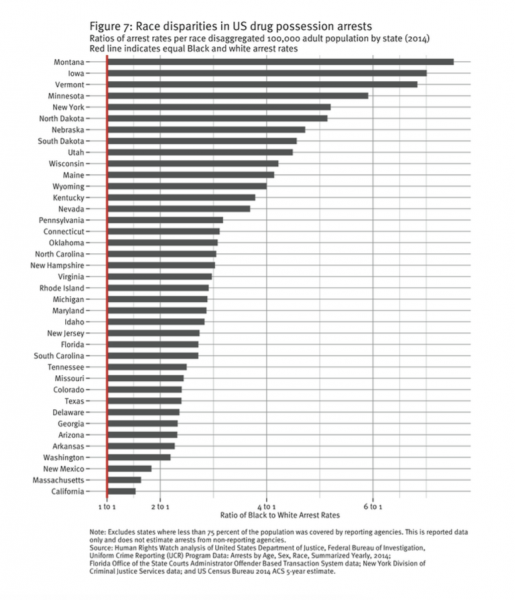 Black Rhode Islanders are almost three times as likely to be arrested for drug charges than white Rhode Islanders, according to a new analysis by the American Civil Liberties Association of Rhode Island.
Black Rhode Islanders are almost three times as likely to be arrested for drug charges than white Rhode Islanders, according to a new analysis by the American Civil Liberties Association of Rhode Island.
“The glaring racial disparities in enforcement of these laws have been going on for too long and must be addressed,” said Steven Brown, executive director of the RI ACLU. “This report is yet another wake-up call about both the overcriminalization of private conduct and the significant racial disparities that permeate our criminal justice system at just about every level.
The report looks at all 50 states done by the ACLU and Human Rights Watch that showed black adults are arrested 2.5 times more often than white adults. In Rhode Island, that ratio is even higher, with 2.9 Black adults arrested for every white adult that is arrested.
Brown said this was “especially troubling” because the report also shows Rhode Island has one of the lowest arrest rates in the nation “per overall population.”
While almost three black Rhode Islanders are arrested for every one white Rhode Islander, there are more than 14 white Rhode Islanders for every one black Rhode Islander. According to the 2010 census, there are 856,000 white Rhode Islanders and only about 60,000 black Rhode Islanders.
Rhode Island has the 21st highest ratio of black-to-white drug arrests in the nation, according to the report. Nearby Vermont has the third highest ratio at 6 to 1 black-to-white drug arrests. Connecticut has the 16th highest average at just over 3 to 1. Massachusetts has the second lowest ratio in the nation at just over 1.5 to 1, second only to California, which is 1.5 to 1.
The national report indicates drugs are the most common reason for arrest made in America and that one of every nine arrests are for drug charges.
“Calling the war on drugs a complete failure that is destroying lives and communities, the report called for decriminalization of personal drug use and possession,” according to a RI ACLU press release. “Instead, the report said, there should be a stronger investment in public health, emphasizing evidence-based prevention; education around the risks of drug use and dependence; and voluntary, affordable treatment and other social services in the community.”
Brown said the new data confirms what the RI ACLU learned when it studied 10 years worth of marijuana arrests in Rhode Island that showed 2.6 to 3.6 black Rhode Islanders were arrested for every white Rhode Islander arrested between 2001 and 2010.
“We hope this report will not only encourage more positive consideration of the marijuana ‘tax and regulate’ bill, but will promote broader efforts by police departments to reconsider how they enforce these particular laws,” said Brown.
Rhode Island continues to take a wait and see approach to legalizing cannabis while Massachusetts voters will decide that question at the ballot this November.

 The Providence Police Department is in the process of finalizing their implementation of a Body Worn Camera (BWC) Pilot Program and working to establish procedures and regulations pertaining to it.
The Providence Police Department is in the process of finalizing their implementation of a Body Worn Camera (BWC) Pilot Program and working to establish procedures and regulations pertaining to it.
A draft of the proposal has been obtained by RI Future. Because it is a draft and not covered by the Access to Public Records Act (APRA), Evan England, Mayor Elorza’s communications director, was unable to verify its authenticity. RI Future has independently confirmed that the draft proposal is the one currently under review.
The pilot program was presented at a meeting held Friday afternoon. Public Safety Commissioner Stephen Paré and Chief Hugh Clements were in attendance, as well as representatives from the City solicitor’s office and several community groups, including the ACLU and the NAACP. Those who attended the meeting were given a week to submit potential revisions to the draft regulations.
Two companies are providing free trials of their body cameras, Taser and Vievu. The timeline is vague, and has not been confirmed by the mayor’s office, but the PPD will have 5 weeks to test each company’s equipment. Once the equipment has been tested, the city will apply for a Federal grant to help pay for the cameras. England was able to say that he knows there are no planned announcements on body cameras over the next few weeks but at the meeting it was suggested that the program could potentially be unveiled as soon as early May.
It is unknown how much public input will be allowed into this process.
This story is developing and there will be more on this as we get it.
Some specifics in the BWC proposal
 According to the draft proposal, which may be amended at any time, “It is the policy of the Providence Police Department to utilize body-worn camera equipment to record and document specific categories of law enforcement interactions with the public, and to institute parameters governing the viewing, storage and dissemination of the associated audiovisual recordings,” according to the draft policy.
According to the draft proposal, which may be amended at any time, “It is the policy of the Providence Police Department to utilize body-worn camera equipment to record and document specific categories of law enforcement interactions with the public, and to institute parameters governing the viewing, storage and dissemination of the associated audiovisual recordings,” according to the draft policy.
Under the BWC Pilot Program the department is issuing BWCs to selected uniformed and investigative officers. “The BWC Pilot Program will be examined to determine whether or not BWCs contribute to officer safety, provide evidence for criminal prosecutions, help to resolve complaints made against personnel, and foster positive relationships with the community. BWCs are only intended to record that which an officer could potentially observe or hear using his/here own senses of sight and sound.”
The pilot program is considered a “work in progress” and it is possible the procedures outlined may be amended when the procedures run up against the “real world.”
Officers will be issued a particular BWC. Officers must continue to write their reports as before. They cannot write “refer to video” but must complete a thorough and detailed report.
Officers are required to activate their BWCs under the following circumstances:
- All enforcement encounters where there is at least reasonable suspicion that a person has committed, is committing or may be involved in criminal activity. This includes, but is not limited to, self-initiated stops and dispatched calls for service.
- All enforcement encounters where there is reason to believe that the individual is committing a violation for which a summons may be issued.
- When initiating and conducting all vehicle pursuits.
- When conducting all vehicle stops.
- Taking or attempting to take an individual into custody (i.e. arrests, mentally ill persons/protective custody situations, etc.)
- All incidents involving a reportable use of force, as soon as and whenever practicable.
- Any public interaction, regardless of context, that escalates and becomes adversarial.
- All building searches/entries made pursuant to criminal or investigatory purposes.
- Whenever an officer judges that it would be beneficial to record an incident, but only when recording does not contradict Section “C”, below.
If the officer does not activate the BWC under the above regulations, the officer must report the reason why to an immediate supervisor both verbally and in a written letter.
The BWCs should not be activated under the following circumstances:
- During encounters not directly related to official activities in the proper performance of police duties.
- During the performance of non-departmental functions or administrative duties within a Department facility.
- In places where a reasonable expectation of privacy exists, such as, but not limited to, the interior portions of domiciles, hospital emergency rooms, locker rooms and restrooms.
- Whenever a potential witness requests to speak to an officer confidentially or desires anonymity.
- Whenever a victim or witness requests that he or she not be recorded and the situation is not confidential.
- Whenever dealing with victims of sex crimes or child abuse.
- Whenever a victim requests that he or she not be recorded as a condition of cooperation and the interests of justice require such cooperation.
- To record any personal conversation of or between another Department member or employee without the recorded member’s /employee’s knowledge and permission
- Whenever the identities and/or investigative techniques of undercover officers would be compromised.
- Whenever performing or present during a strip search of a detainee.
Officers who make a prohibited recording must make a request for deletion to their immediate superior as soon as practicable.
Officers must inform, as soon as practicable, that they are recording by using the phrase, “I am advising you that our interaction is being recorded.” That said, permission from the subject is not required to record.
The BWC can not be stopped until the interaction is complete. Interruptions or premature terminations of recordings need to be reported and justified.
The recordings collected will be considered the property of the PPD. Members of the PPD may not copy, publish, share or disseminate any BWC audio or video without the permission of the Chief of Police or the Commissioner of Public Safety. Also, the recordings may not be edited, deleted or altered. They may not be stored on a cloud server or other media storage devices.
Video will be stored for 90 days, at which time it will be automatically deleted unless it is ordered to be archived.
It is a violation of the policy for recordings to be reviewed solely for the purposes of searching for instances of Department members committing violations of law or Department policy, unless reviews are related to a specific complaint, allegation or incident.
]]>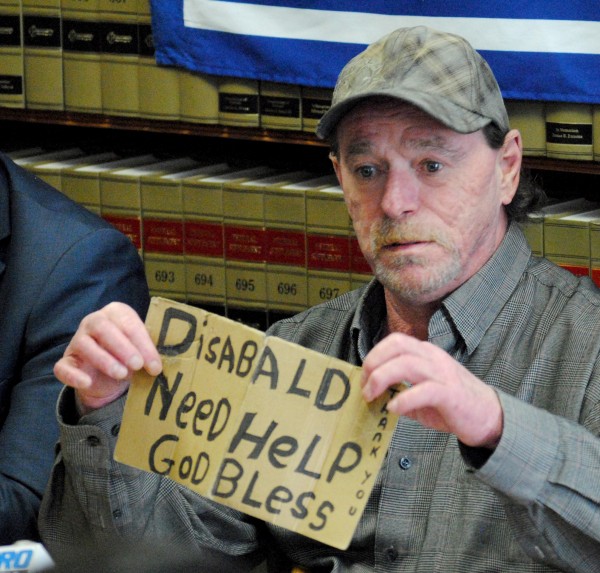
The Rhode island ACLU today launched the “first of a series” of lawsuits aimed at the current trend of municipalities to criminalize poverty and homelessness. At issue is Michael Monteiro, a 57 year old disabled man who until recently supplemented his disability payments by asking for money on a median strip in Cranston, holding a sign that says, “disabled, need help, God bless.”
On June 30 a Cranston police officer wrote Monteiro a court summons for soliciting money. The charge was ultimately dismissed, but the judge ordered Monteiro to stay away from the area or face arrest. This was Monteiro’s second run in with this law in Cranston, after having been arrested twice for the offense in Providence, where he lives.

Attorney Marc Gursky, representing Monteiro, says the ordinance prohibits individuals from soliciting for money, but is selectively enforced against people like Monteiro, and not against fire fighters, cheerleaders or little league teams. Monteiro said that when he sees the cheerleaders on the median where he usually solicits donations, he leaves for the day.
Gursky also alleges that the ordinance violates the free speech clause of the Constitution. It cannot be against the law to ask for help, or to request money. If the issue is truly one of traffic and safety, says Gursky, the city should address the problem of traffic and safety, not free speech.

Megan Smith, an outreach worker and case manager with House of Hope‘s PATH program, said that cities and municipalities across the nation are dealing with the problem of homelessness and poverty by criminalizing those who are homeless and poor. Arrest places the burden of a criminal record on those affected, making it more difficult to get people the help they need.
“Poverty should make us uncomfortable,” said Smith, but these ordinances are attempts to hide the problem from sight, not to help people.
Steve Brown, executive director of the RI ACLU, said that there is no timeline on when future lawsuits will be undertaken on this issue, but that Providence and Pawtucket both have similar ordinances, and both cities could face such lawsuits. Finding plaintiffs is difficult, because people in Monteiro’s position face a lot of discrimination and it takes real courage to commit to such a suit.
As for Monteiro, he used to make $20-30 standing on the corner for about an hour, which is as long as his legs could endure. He hasn’t returned to his spot since the judge’s order, and as a result, “I have to do without…
“I have about $11 to get through the rest of the month,” he said.
Edit: Shortly after the post went up, I was asked how someone might get some money to Michael to help him while he’s waiting for this case to resolve. Steve Brown said that the ACLU can accept donations to him as long as the donations are clearly marked as being for him at this address:
American Civil Liberties Union of Rhode Island
128 Dorrance Street
Suite 220
Providence, RI 02903
If the donation is not marked, they’ll probably assume the donation is for the ACLU, which is not a bad investment.

 The American Civil Liberties Union of Rhode Island today announced the settlement of a federal lawsuit on behalf of Jason Cook, an ACI inmate who, the suit alleged, was the victim of retaliation by prison officials for publicly criticizing RI Department of Corrections’ (DOC) mail policies and seeking legal assistance from the ACLU. Under the settlement, the DOC, while denying any liability, has agreed to pay a total of $7,500 in damages and attorneys’ fees.
The American Civil Liberties Union of Rhode Island today announced the settlement of a federal lawsuit on behalf of Jason Cook, an ACI inmate who, the suit alleged, was the victim of retaliation by prison officials for publicly criticizing RI Department of Corrections’ (DOC) mail policies and seeking legal assistance from the ACLU. Under the settlement, the DOC, while denying any liability, has agreed to pay a total of $7,500 in damages and attorneys’ fees.
The ACLU of RI filed the suit in 2009 after Cook experienced a pattern of harassment by prison officials after being quoted in the Providence Journal criticizing a new DOC policy limiting the written materials available to inmates. He was fired from his job in the kitchen, and after the ACLU of RI questioned the mail policy, the suit alleged that correctional officers conducted a search of Cook’s cell that damaged some of his personal property, and then subjected him to various investigations, bookings, discipline, and unwarranted strip searches.
The ACLU argued that this pattern of harassment by corrections officials against Cook violated his First Amendment right to freedom of speech “and displayed both deliberate indifference and a reckless disregard of Cook’s constitutional rights.” Prison officials’ alleged misconduct continued even after Cook filed suit. The day after the complaint was served on a number of the defendants, the suit claimed that all of the previously active phone numbers on Cook’s call list, except for his attorneys, were suddenly deactivated.
The suit further claimed that the various disciplinary actions taken against him violated Cook’s due process rights. In 2013, U.S. District Judge William Smith rejected the DOC’s efforts to have the lawsuit dismissed.
ACLU volunteer attorney Shad Miller, from the law firm DeLuca & Weizenbaum, Ltd., said today: “I give Jason a lot of credit for pursuing his claims against individuals and an institution which had tremendous power and control over every activity of his daily life. It took courage to challenge these authorities and to hold them responsible for their allegedly unwarranted and retaliatory acts against him. It also took persistence to see the legal process through to reach a satisfactory resolution because at every step of the way the defendants vigorously denied and disputed the allegations against them.”
Plaintiff Cook stated: “The federal court has righted the wrongs committed against me. I hope that this settlement will send a clear message to the employees of the state prison that just because a person is incarcerated, we are still human beings and have rights.”
The mail policy at issue that Cook initially protested, and that was ultimately withdrawn after the ACLU intervened, barred family members from ordering books or magazine subscriptions for inmates. Instead, inmates could only obtain publications directly from a publisher with their own funds.
More information about the case is available here: http://riaclu.org/court-cases/case-details/cook-v.-wall
[From an ACLU press release]
]]>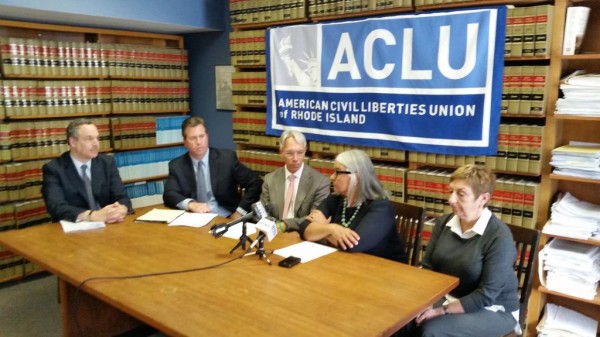 The American Civil Liberties Union of Rhode Island (ACLU) today filed a class action lawsuit in U.S. District Court to challenge the constitutionality of a recently enacted law that makes it a crime for certain sex offenders to reside within 1,000 feet of a school. As part of the suit, the ACLU has requested a restraining order to halt the law’s “inconsistent” and “arbitrary” implementation before any more individuals are uprooted or made homeless.
The American Civil Liberties Union of Rhode Island (ACLU) today filed a class action lawsuit in U.S. District Court to challenge the constitutionality of a recently enacted law that makes it a crime for certain sex offenders to reside within 1,000 feet of a school. As part of the suit, the ACLU has requested a restraining order to halt the law’s “inconsistent” and “arbitrary” implementation before any more individuals are uprooted or made homeless.
The new statute, passed overwhelmingly in the Rhode Island House of Representatives under the leadership of Speaker Nicholas Mattiello, is unconstitutional on three grounds, says Attorney John MacDonald, who filed the suit with Attorney Lynette Labringer today.
The statute is unconstitutionally vague, says MacDonald, with no definition of what constitutes a school in the law. Further, there are no guidelines offered as to how to measure the 1000 feet required under the mandate. Different law enforcement agencies use different systems operating under different parameters. A resident might be told he is safe by one agency, only to be ordered to move by another.
The law is unconstitutional because it violates due process. Level 3 sex offenders are banished from their property and their liberty under this statute, says MacDonald, and they have no recourse to a hearing unless they want to be arrested and charged in violation of the law.
The third constitutional violation occurs because under this statute, people who have already paid for their crimes are being further punished in having to move under threat of arrest.
The statute does not increase public safety, says MacDonald, and the homeless advocates in attendance at the press conference all agreed with this assessment. It is better to know where level 3 sex offenders are living, “but we have uprooted them and sent them to Harrington Hall, the only place that can house them.”
Jim Ryczek, who heads up the Rhode Island Coalition for the Homeless (RICH), is in full support of the lawsuit. “We are proud to have helped keep communities safe,” said Ryczek, adding that the three factors that keep people from re-offending are stable housing, employment and treatment. The law, if it is allowed to stand, threatens all three of these factors.
Not only is there no evidence that this law might help Rhode Islanders, this law “may have an opposite effect” says Ryczek.
Sol Rodriguez, executive director of OpenDoors, read her statement, saying, “People affected are being forced out of their apartments; some are homeowners, have families, are sick, disabled, and some live in nursing homes. Some are family caretakers. They have served the sentence imposed for their crimes and are known to law enforcement due to sex offender registry laws. This law will further destabilize this population.”
Jean M. Johnson is executive director of House of Hope CDC which manages Harrington Hall. Presently, this is the only facility that can house homeless, level 3 sex offenders in the state. During Wednesday night’s rain storm, “160 gentlemen inhabited Harrington Hall,” she said, “we are a 120 bed facility. We have always had level 1, 2 and 3 offenders stay with us. We are the shelter of last resort, we don’t turn anyone away.”
On Monday night, when the law is to be in full effect, 30 level 3 sex offenders could show up at Harrington Hall, in Speaker Mattiello’s district.
The new law, says Johnson, is “unjust and unfair.”
Beyond the issues of constitutionality and public safety, says Steve Brown, executive director of the RI ACLU, the law makes no sense. Many level 3 sex offenders were convicted for crimes against adults, and against adults they knew personally. These men are presently allowed to travel near and be around schools, but under the law are not allowed to keep in an apartment near a school, when the schools are empty.
As far as simply finding an apartment elsewhere, this is not really an option, said Jim Ryczek. Many landlords will not rent to a level 3 sex offender. Finding an affordable location that satisfies the 1000 feet limit in the amount of time available is all but impossible.
In Providence, 30 men have been told that they will have to move. A reporter at the press conference said that Speaker Mattiello was “getting pressure” to address the situation at Harrington Hall, but Jean Johnson said that no one from the Speaker’s office has reached out to her.
More information is available here.
]]> The American Civil Liberties Union of Rhode Island has called on all school districts that currently have school resource officers (SROs) to re-evaluate their use in the schools and to revise the agreements they have with police departments that set out their job responsibilities. The call was prompted by incidents at Pawtucket’s Tolman High School last week, which reinforced many of the serious concerns the ACLU has long held regarding the routine presence of police officers in schools.
The American Civil Liberties Union of Rhode Island has called on all school districts that currently have school resource officers (SROs) to re-evaluate their use in the schools and to revise the agreements they have with police departments that set out their job responsibilities. The call was prompted by incidents at Pawtucket’s Tolman High School last week, which reinforced many of the serious concerns the ACLU has long held regarding the routine presence of police officers in schools.
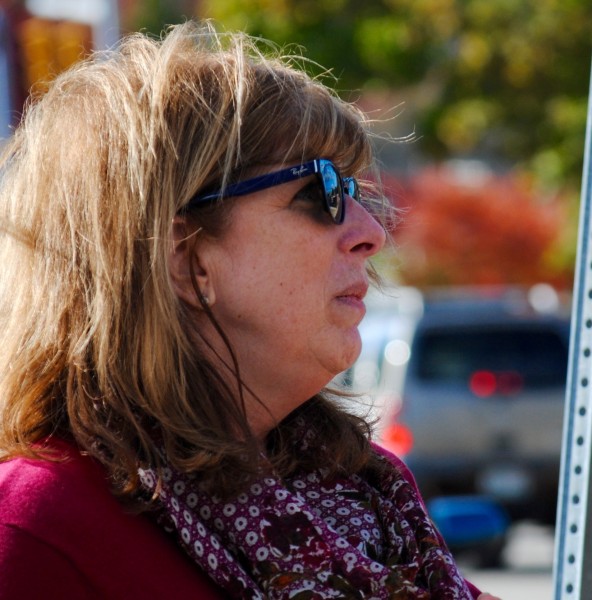
In a letter sent to Pawtucket school district superintendent Patti DiCenso on Tuesday and shared with school superintendents across the state, ACLU of RI Executive Director Steven Brown noted that school districts cede an “enormous amount of control” when they sign Memorandums of Understanding (MOU) with police departments, and that this “unnecessarily set the stage for last week’s series of ill-fated events” in which an SRO’s attempt to handle a single student’s behavioral issue led to the injury and arrest of the student and his brother, the arrest of eight other individuals, and the pepper spraying of numerous youth.
Reviewing the MOU in effect in 2011 between the Pawtucket school district and the police department, the ACLU noted that it designates the SRO as the school’s “law enforcement unit” who reports to the police department, not the school principal. In fact, the MOU authorizes the SRO to remove a student from school without notifying school officials, and, if the SRO charges a student with a crime, requires the principal to support the officer’s decision in any legal proceedings.
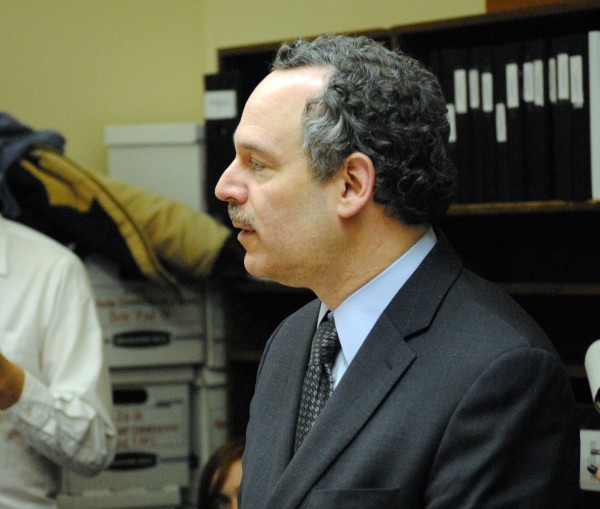
The Pawtucket MOU further specifies that all SRO assignment and retention decisions are made at the complete discretion of the Chief of Police, not school officials. In addition, while the MOU recognizes the importance of selecting officers with demonstrated abilities and skills in working with students, officers are not required to receive any training on addressing behavioral issues or understanding the needs of students. The ACLU questioned how seriously those interests and skills are considered in light of the fact that the SRO at the center of last week’s incident had been investigated for a videotaped incident in which he pepper-sprayed and repeatedly hit a man with his baton just months before he was assigned to the high school.
In the letter to Supt. DiCenso, the ACLU’s Brown stated: “Despite the tremendous power that SROs wield in an educational environment, your school district’s MOU allows police officers to walk the halls of schools with little responsibility to school officials themselves. That is because, at bottom, they serve the police, not the school.”
 The letter acknowledged that Pawtucket should not be singled out for such problems. A 2011 review by the ACLU of SRO use across the state found that many school departments had similar “one-sided” MOUs and that there were many incidents in which the presence of a police officer escalated a student’s minor infraction, such as wearing a hat in school, into an arrest for disorderly conduct.
The letter acknowledged that Pawtucket should not be singled out for such problems. A 2011 review by the ACLU of SRO use across the state found that many school departments had similar “one-sided” MOUs and that there were many incidents in which the presence of a police officer escalated a student’s minor infraction, such as wearing a hat in school, into an arrest for disorderly conduct.
“When a student’s immature behavior is addressed by a law enforcement official trained in criminality and arrest, not in getting to the root of a behavioral issue, neither the child nor the school is well served. In short, the presence of SROs redefines as criminal justice problems behavior issues that may be rooted in social, psychological or academic problems, for which involvement in the juvenile justice system is hardly the solution,” Brown stated in the letter.
The letter called on school districts to take responsibility for the police officers in their schools in order to prevent incidents similar to last week’s from happening again. In a series of recommendations, the ACLU urged Pawtucket and any other school departments that continue to use SROs to revise their MOUs to ensure school officials have a meaningful role in the selection of SROs and that, absent a real and immediate threat, school officials, not police, handle all disciplinary matters. The MOUs, the ACLU said, should also require SROs to receive annual training on issues such as restorative justice and adolescent development and psychology; establish clear limits on the use of force; and put in place simple procedures for students to raise concerns about the SRO.
Following delivery of the ACLU’s letter, a news article in the Valley Breeze indicated that Pawtucket school officials plan to review their agreement with the police department. The ACLU welcomes Pawtucket officials and officials from any other district re-evaluating their policies to contact its office for guidance.
[From an RI ACLU press release]
]]>
There are disturbing reports from Tolman High School students in Pawtucket concerning the behavior of police officers during yesterday’s mass arrest of eight student and two adult protesters.
One protester, said a student, was “arrested for flipping off the cops,” a constitutionally protected form of speech.
Another student who has “really bad asthma” was suffering an asthma attack after being hit with pepper spray. The student was told by police officers that she could “go to the hospital and get arrested, or you can stay here,” according to witnesses.
The protest outside the school Thursday morning was happening without a lot of the students inside the school being aware of what was happening. After a fire alarm was pulled, (for which a student was arrested) students flooded outside.
“Pulling the alarm was a good idea,” said a student, “No one knew what was going on until we all came out.”
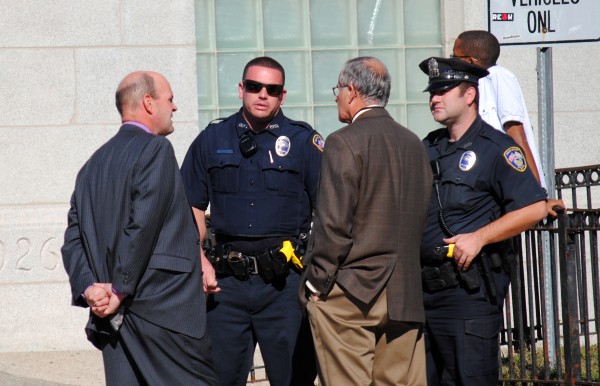 Students involved in the protest were told that they were not allowed to have cellphones on their person while in school that day. “They didn’t want us communicating with people outside,” said the student.
Students involved in the protest were told that they were not allowed to have cellphones on their person while in school that day. “They didn’t want us communicating with people outside,” said the student.
Some students who refused to turn in their cellphones were refused readmission to the school, yet students feel the cellphones are necessary to protect themselves. After all, it was a cellphone video of a violent police arrest that sparked these incidents.
There was also some pushback against the mediation offered by the Institute for the Study and Practice of Nonviolence. Some students feel that the Institute street workers are more interested in “telling us to go back to class” than in addressing the root causes of the problem, which they see as the presence of police in the schools.
Some students want school resource officer Jared Boudreault removed from the school and fired from the Pawtucket Police Department for his actions. But more than that, they want police entirely out of schools. Instead of policing and suppression, some students say they want respect and the help of adults who are able to deescalate situations.
Meanwhile, representatives from several community and social justice groups are decrying the events of the last two days as evidence of the school to prison pipeline. The RI ACLU has repeatedly shown that across Rhode Island, “black [and Latino] children face unwarranted racial disparities in their earliest years, with long lasting consequences. The disparities begin in the classroom, and at a very early age.”
“I really think it has to do with race,” said a Tolman student. She was speaking from her own experiences in high school and not quoting from a report.
]]>
Rhode Island Superior Court Judge Richard Licht refused to dismiss a case in which a University of Rhode Island graduate student alleged that she was denied employment due to her status as a medical marijuana user.
The case, which was filed by the American Civil Liberties Union in November of 2014, concerns URI grad student Christine Callaghan, who is working towards a masters’ degree in textiles. Callaghan is also a registered medical marijuana user in order to deal with frequent migraine headaches. In July of last year, Callaghan was slated to begin a paid internship with Darlington Fabrics in Westerly, which she needed to finish her degree. After disclosing her status as a medical marijuana user, the company withdrew her internship.
In the lawsuit, the ACLU argues that Darlington has violated the Hawkins Slater Medical Marijuana Act. Callaghan’s attorney, Carly Beauvais Iafrate, said that because the company had no other reason to withdraw their offer from Callaghan, they are breaking the law.
“Under the Hawkins Slater Medical Marijuana Act, when the General Assembly put that really critical employment language in, which essentially says that no person will be not hired or denied any privileged in employment because of their cardholder status,” she said. “They didn’t then put any language in there that says if someone violates that section, you can sue them. That’s called a private right of action. So what [Darlington’s lawyer] was saying was there’s nothing in the statute that says you can sue anybody over it, and so therefore, you shouldn’t be allowed to.”
Iafrate said the defendant’s argument relies on what is normally written into other disability laws, that lay out penalties for those who violate the law, be it a fine or the right to sue. The Hawkins Slater Medical Marijuana Act lacks that language. In other situations, the Rhode Island Supreme Court has not assigned a remedy and implied a private right of action, but Iafrate says that this case is different from the precedent that has already been set.
“Those other situations are different, because in this statute, the General Assembly said liberally construe this to make sure that the purpose is effectuated, so that it doesn’t become meaningless,” she said. “Think about it. If there’s no remedy, what meaning does it have that they say that no employer can refuse to hire? They can just do it anyway, because there’s no remedy.”
The ACLU is also arguing that by refusing to hire Callaghan, Darlington has discriminated against a disabled person, and is in violation of the Rhode Island Civil Rights Act.
Licht did not approve Darlington’s motion to dismiss for a number of reasons, but his biggest reason dealt with the Medical Marijuana Act, and Darlington’s argument that there is no private right of action, and that they should be allowed to not hire Callaghan to ensure a drug free workplace.
“It’s inconceivable to me that the General Assembly meant to say discriminate against for the use of marijuana, even though you can’t discriminate against them because they hold a card that allows them to use it,” Licht said. “I doubt there are many people who sought out a medical marijuana card that don’t use it.”
While Callaghan is seeking compensatory and punitive damages, Iafrate said she had other reasons to sue as well.
“One of her main purposes, which is why she went to the ACLU, is because this is an important issue, and it needs to be decided. People who are engaging in the medical use of marijuana in the state need to know whether they have employment protection or not. And they need to know whether it’s just words on paper or if it actually means something,” Iafrate said.
In a press release from the ACLU, Callaghan said that she would like companies to treat medical marijuana patients just as they would any other employee who may take medication for a chronic illness.
The next step is for the case to go to summary judgment and for both parties to engage in discovery of evidence and facts. Iafrate said this should happen within the next year.
]]>